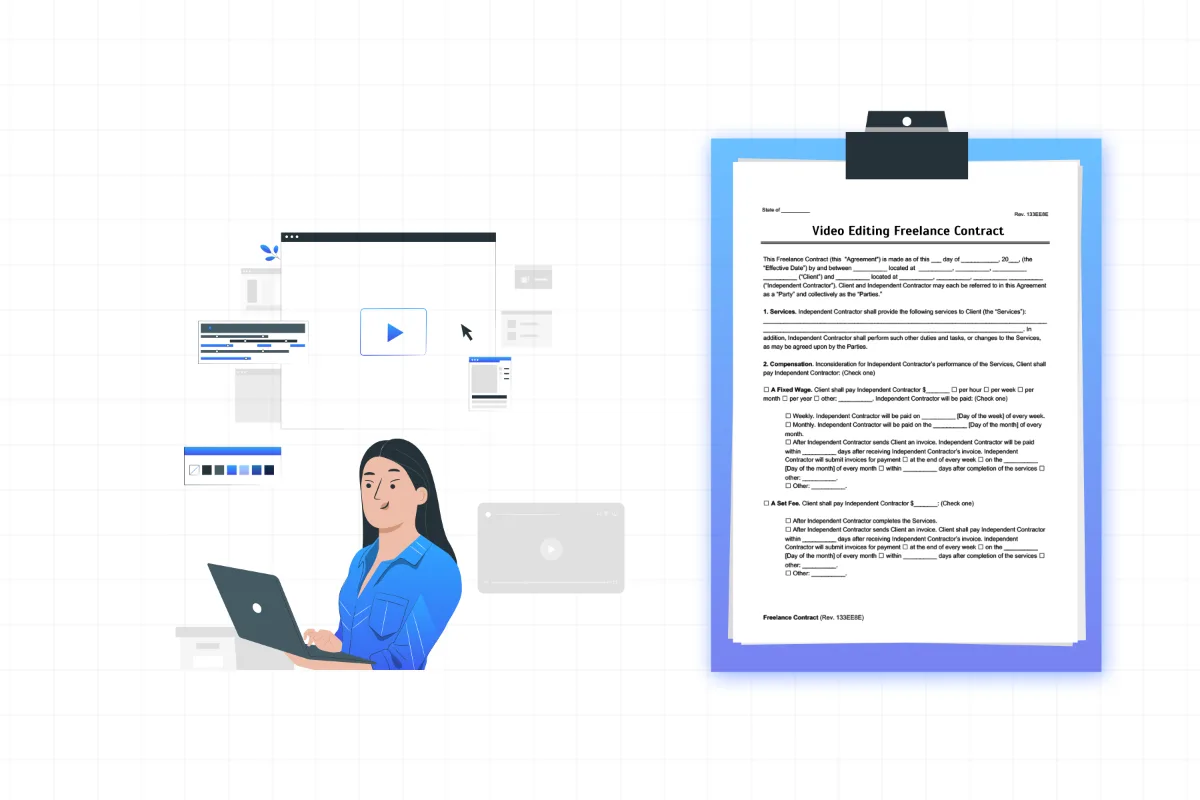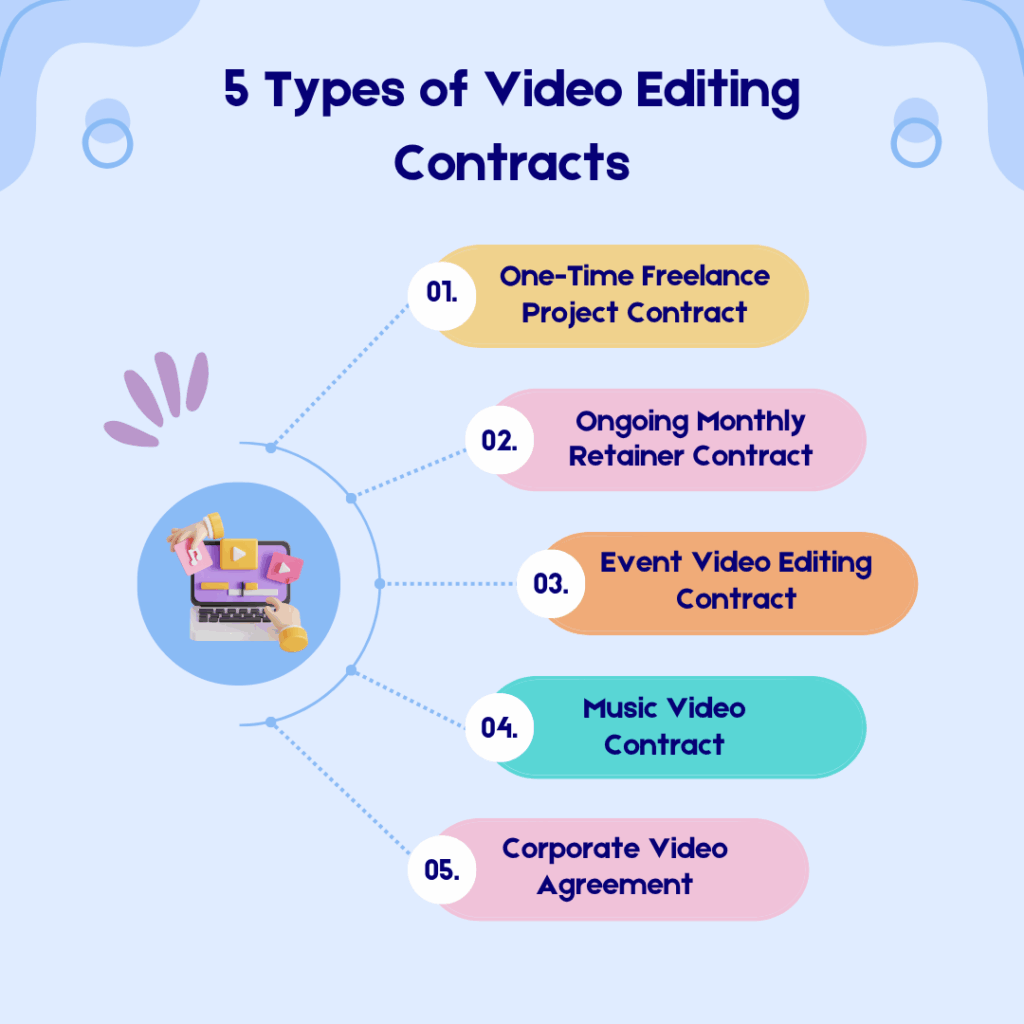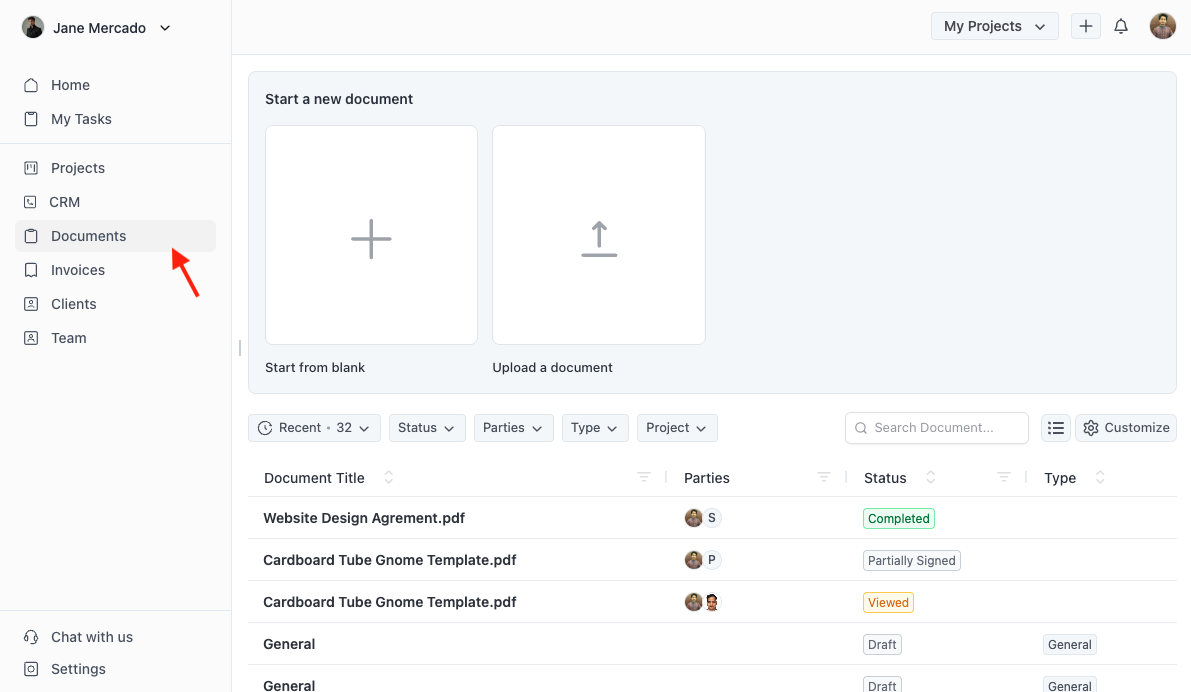
If you’ve ever sent off an edited video and then waited days (or weeks) for feedback, final payment, or worse, radio silence, you already know why having a contract matters.
In freelance video editing, things can get messy fast. A client might ask for endless revisions, delay payments, or misunderstand what’s included in your services. These aren’t rare issues, but they’re the norm when there’s no explicit agreement.
That’s precisely why a video editing contract isn’t just a formality. It’s your protection plan.
A good contract doesn’t just help you get paid. It sets expectations, defines boundaries, and gives your project structure from the first draft to the final export. It keeps everyone on the same page (and out of legal grey zones).
In this guide, we’ll explain everything you need to know and provide a free freelancer video editing contract template that you can customize in minutes with OneSuite.
We’ll cover:
- What a video editing contract is
- The most important clauses to include (and why they matter)
- Common types of video editing agreements
- How to use OneSuite to build and sign your contract
Let’s get into it.
Free Video Editing Contract Template (Download First!)
Before we dive in, if you’re here for the contract, go ahead and grab it now:
⚠️ Disclaimer: I’m not a lawyer, and this isn’t legal advice. Always speak to a qualified attorney when drafting contracts.
Quick Start: OneSuite Video Editing Contract
Writing contracts might not be your favorite task, but this one makes it painless. Whether you’re a video editor or a small agency, this template helps you look professional and stay protected.
Here’s how to make it your own:
🟨 Step 1: Fill in the Yellow Sections
Anywhere you see yellow highlights, that’s your cue. Fill in the blanks with:
- Your name, business name, and contact info
- Client’s full name and contact info
- Project title, scope of work, and key deliverables
- Start and end dates (or phase-by-phase deadlines)
- Payment terms: fixed rate, hourly, milestone-based, or retainer
- Invoicing schedule and payment method
- Revisions, late fees, or any out-of-scope pricing
- Signatures and dates
Tip: Be specific. A vague contract creates headaches later, set clear expectations now.
Step 2: Review with the Client
Before signing, send the draft to your client and walk through:
- Are the services and deliverables accurate?
- Is the payment structure and schedule clear?
- Are both sides aligned on who owns what (IP)?
- Do you both understand revision policies and termination rights?
Step 3: Clean and Finalize
Anywhere you see yellow highlights, that’s your cue. Fill in the blanks with:
- Remove all yellow highlights
- Check for typos, double spaces, or missing info
- Save the final version as a clean, secure PDF
Step 4: Sign and Store Securely
Use an e-signature tool like OneSuite to sign and send. It tracks signatures, keeps documents organized, and sends reminders if needed
No printer, no scanner, just smooth digital handling.
Want help sending or customizing your contract inside OneSuite?
👉 [Visit our Help Center] or start your free 14-day trial, no credit card needed.
Want a quick demo?
👇 Watch how to send and sign your agreement in less than 3 minutes:
⚡️ See Also: How to Write a Contract Agreement: A Simple Step-by-Step Guide
What Is a Video Editing Contract?
A video editing contract template is a ready-to-use agreement that outlines the key terms between a video editor and a client. It covers project scope, payment terms, deadlines, revision limits, usage rights, and cancellation policies, all in one place.
Instead of writing a new contract for every project, you can customize this template to fit different clients or jobs. Whether you’re a freelancer working solo or an agency managing multiple editors, this template helps protect your time, clarify expectations, and keep the project on track.
It also ensures that both parties agree on the deliverables before the work begins so there is no confusion later.
In short, it’s your go-to tool for staying professional, getting paid, and avoiding scope creep.

Key Clauses in the Video Editing Contract
A solid contract protects both the client and the video editor. These 6 must-have clauses ensure clarity, fairness and professionalism whether you’re a freelancer, agency or client.
Parties Involved
Every video editing contract template should list who’s part of the agreement, you (the freelancer or editor) and the client or agency. Make sure it includes:
- Full names of both parties
- Email addresses and contact numbers
- Business or company names (if applicable)
- Signature fields for both sides
Why it matters: Having these details in writing ensures the contract is valid and enforceable. It also makes communication easier and keeps things professional, especially for freelancers working with new clients or remote teams.
Scope of Work and What’s Included
This is the core of your video editing contract template. Be specific, unclear deliverables lead to unpaid work, missed deadlines, and client confusion.
Your scope should cover:
- Pre-production (if applicable): script review, concept input, asset organization
- Post-production: footage cuts, colour correction, transitions, audio sync, and final export
- Revisions: how many rounds, what’s included, and what counts as extra
- Delivery: file formats (e.g., MP4), how files will be sent, and when
Also, state what’s not included, like sourcing music, voiceovers, or stock footage, unless agreed upfront.
The goal? Define what you’re doing, what you’re not, and when your job is officially done. That’s what makes a freelance video editing contract clear and bulletproof.
Delivery Dates and Deadlines
Your video editing contract should make one thing clear: when things are due, and from who.
You’re not just delivering a final video. You’re managing a process. That means setting timelines for receiving client assets (like footage, scripts, branding), producing drafts, handling revisions, and exporting the final cut.
If you’re editing a 3–5 minute social media video, you might promise a rough cut within 5 business days after getting everything you need. Revisions? Within 2 days of feedback. Final delivery? 48 hours after approval.
But here’s the catch your timeline depends on them sticking to theirs. If files or feedback are late, your clock resets. Make sure your freelance video contract says that.
Set expectations now, and you won’t be chasing deadlines later.
Revision Policy and Limits
For both clients and freelance video editors, setting clear revision terms is non-negotiable. Without it, “just one more tweak” can turn into hours of unpaid work or worse, a strained working relationship.
Your contract should clearly state how many rounds of revisions are included in the project. Most freelancers offer 1–2 rounds, enough to refine the video without starting from scratch. If the client asks for more than that, make sure your contract allows you to charge extra, either per hour or per revision.
This protects your time and ensures the client knows where the boundaries are. And for clients, it provides clarity: they’ll know exactly what to expect, how to give feedback, and when additional fees might apply.
Payment Terms
Your time isn’t free, and your contract should reflect that. Clearly state how you expect to be paid whether that’s 50% upfront and 50% on delivery or full payment within 7 days after final delivery. Break down your pricing by task so there’s no room for confusion.
Always include your preferred payment method, like PayPal or direct deposit. Late payments? Call it what it is, a breach of contract.
Charge a weekly late fee, and reserve the right to take legal action if payment doesn’t come. Clear terms mean you get paid on time every time.
Need a simple way to manage payments?
Try OneSuite’s invoicing system Free for 14 days. It helps you send branded invoices, track payments, and get paid faster.
Confidentiality and NDA
Every freelance video editing contract should include a clear confidentiality clause. During a project, you may handle private content, like unreleased footage, scripts, internal brand assets, or marketing plans. That information stays between you and your client. You’re agreeing not to share, publish, or leak anything, especially to competitors.
Likewise, your client must respect your work. No sharing your drafts, editing process, or behind-the-scenes footage without your permission. This clause protects both parties, your creativity, and their sensitive business info.
Whether you’re working with startups, agencies, or large brands, this part of the contract builds trust, and keeps everything professional.
5 Types of Video Editing Contracts You Might Use
Choosing the right video editing contract protects your work and sets clear client expectations. Different projects need different agreements based on scope, timeline and goals.

Here are the most common types to consider:
1. One-Time Freelance Project Contract: This is ideal for a single, clearly defined project ,like editing a promo video, testimonial, or YouTube clip. It outlines the project scope, deadlines, number of revisions, and payment terms. Use this when there’s no ongoing commitment after delivery.
2. Ongoing Monthly Retainer Contract: If you’re working with a client long-term, a retainer contract makes sense. It sets expectations for how many videos or hours you’ll deliver monthly, revision policies, and billing structure. This keeps income steady and workflow predictable.
3. Event or Wedding Video Editing Contract: Event-based projects need a detailed agreement. For weddings, conferences, or live events, include timelines, deliverables, cancellation terms, and backup policy. It ensures clarity on expectations for both shooting and editing.
4. Music Video Contract: Music video editing contracts are typically more creative and collaborative. Be sure to cover editing style, deadlines, creative direction, music licensing (if needed), usage rights, and credits. A clear agreement protects your vision and your time.
5. Corporate or Business Video Agreement: Businesses hiring you for product demos, training videos, or brand content need a more structured video production agreement. Include brand guidelines, approval process, turnaround time, and usage rights. Professionalism here builds long-term trust.
Seo also : Create and sign contracts easily with OneSuite free online contract maker.
Use OneSuite to Build Your Contract in Minutes
Creating a free Video editing contract template in OneSuite is quick and hassle-free. Start by clearly outlining all services, deliverables and payment terms. You can either upload your finalized contract as a Docs file or use OneSuite’s editor to create it directly within the platform.

Here’s how to get started:
- Write Your Contract – Use OneSuite’s editor to create a clear contract outlining your services, deliverables, and payment terms.
- Upload to OneSuite – Go to the Documents section and upload your contract.
- Add Signature Fields – Add fields for both you and your client to sign and date the contract.
- Link to Client Profile – Attach the contract to the client’s profile for easy tracking.
- Send for Signature – Send the contract to your client via a secure link for signing.
- Lock Contract Automatically – Once signed, the contract will be locked automatically, providing a legally verified document.
- Save as a Template – Save the contract as a reusable template for future projects.
FAQs
Ready to streamline your contract process?
Create your free Freelancer video editing Contract template today with OneSuite! Save time, eliminate paperwork hassles and ensure smooth client projects.
Is a digital signature legally valid?
Yes, digital signatures are legally valid and enforceable in most countries. They carry the same weight as handwritten signatures when used properly.
Can I use this template for different clients?
– Yes, just remove the previous details and add the new client’s requirements.
Wrap-Up:
Ready to simplify your video project workflow? Create your free freelancer video contract template today with OneSuite, save time, stay organized, and protect every project from start to finish.
A strong video contract isn’t just a formality it’s your safety net. It clarifies scope, timelines, deliverables, and payments, so there’s no room for confusion. With clear terms, client trust increases, revisions are minimized, and you stay focused on delivering standout content, not chasing approvals or unpaid invoices.
With OneSuite, you can create, send, and sign video contracts in minutes, all in one place. No more switching tools or chasing clients for signatures. Whether you’re freelancing for brands, agencies, or influencers, OneSuite helps you stay professional and in control.
Start your free 14-day trial today, no credit card needed. One smart tool to manage your contracts, so you can focus on what you do best: creating amazing videos.
𝌋 Access more professional templates :
Find a Better Way to Grow
OneSuite streamlines projects, clients, and payments in one place, making growth hassle-free.



